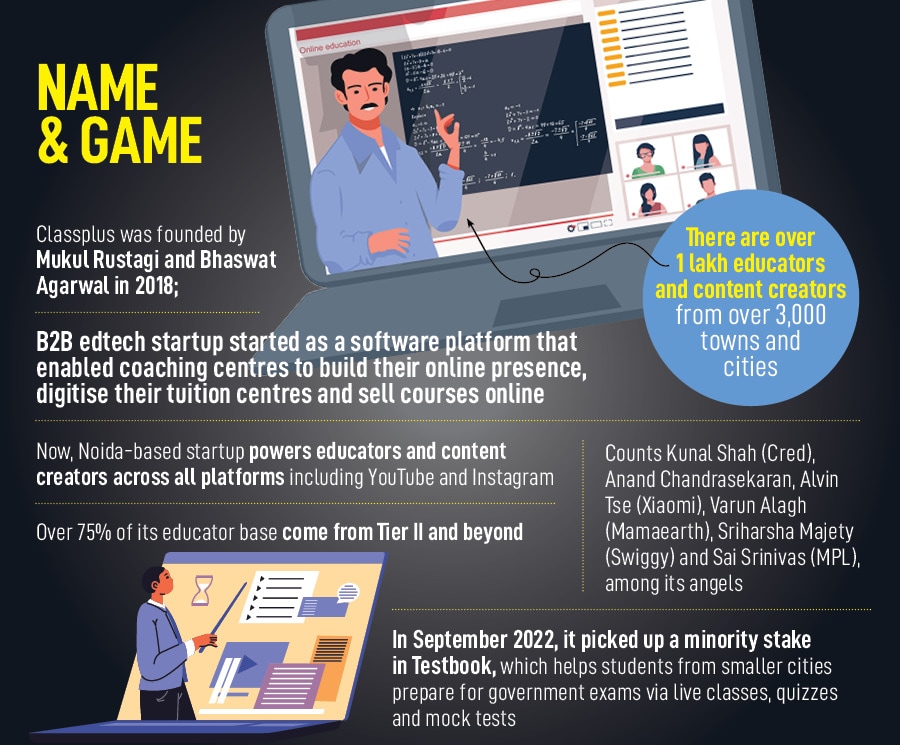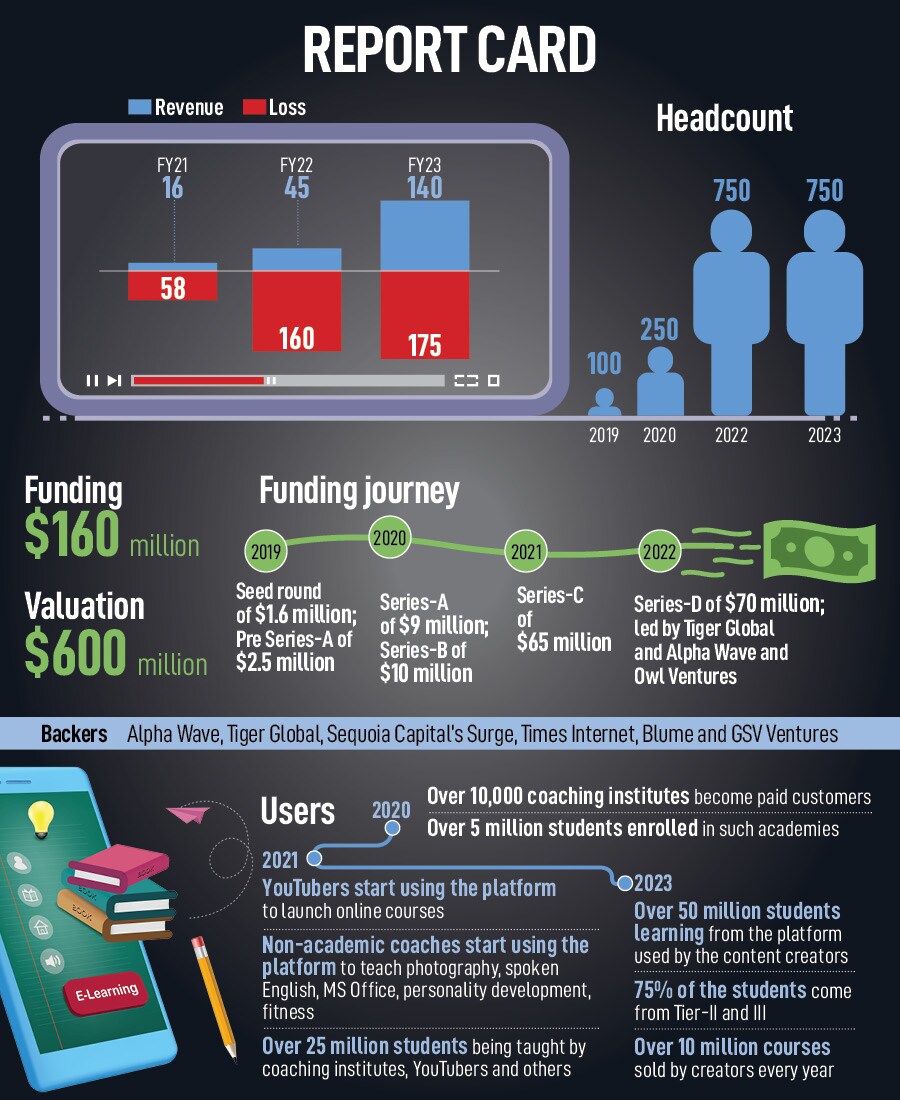Then one fateful day, came a sudden twist in the tale. Nah, it was an overwhelming itch. Agarwal decides to become a founder, he makes a call to Rustagi and asks him to become a partner in crime. “I was going to start something with someone I could trust my life with," recalls Agarwal. “I knew even if we failed, we would have fun in the process." Rustagi, for his part, has been an introvert. He knew that if there is one person he would be most comfortable with when it comes to starting a venture, it was Agarwal.
So, there were no second thoughts. Maths did make sense, the chemistry between the friends looked perfect, and the duo now took a leaf from physics and resigned at lightning speed. “We didn’t procrastinate a bit," underlines Rustagi, who teamed up with Agarwal, decided to take a stab at the world of education, and took a plunge into entrepreneurship in early 2016. “Not thinking too much was the good part," he says. The friends managed to get a modest funding of Rs 50 lakh. “This was one more good part," he adds.
Well, there was a bad part as well. Eight years after quitting their maiden jobs, Rustagi tells us why the impulsive move didn’t make sense. “We never planned. And that was a bad thing to do," he rues. There was no business idea and the venture didn’t have a name. “There was nothing," he says. For the next two years, 2016 and 2017, the duo tried multiple things. From online tutoring to refining the content of coaching centres to everything and anything related to education, the friends kept hopping and trying new ventures every two months. Nothing worked, though. There were three simple reasons. Rustagi explains. First, there was no focus. Second, there was no conviction. Lastly, there was no market knowledge.
By November 2017, it looked like the duo had hit a dead end. There was just a month of runway left, and still there was no clarity on ‘what next’, and the writing was on the wall. The strugglers, though, seemed to be the odd ones out in the edtech universe which was witnessing the emergence of two rising stars, Byju’s and Unacademy. Both had raised loads of money, were expanding at a furious pace, and their naked aggression had petrified offline coaching players of all shapes and sizes. In the larger edtech story playing out in India in 2017, Rustagi and Agarwal were at best ‘supporting actors’, while Byju’s and Unacademy were dubbed as Goliaths.
Then came an ‘aha’ moment in December 2017. Call it an epiphany, the struggling actors spotted a superstar and an army of Davids. First, let’s talk about the superstar. “Teacher mohalley ka Shah Rukh Khan hota hai (the teacher is the Shah Rukh Khan of a locality)," says Rustagi. And this superstar was waging a losing battle against the heavily loaded and new age edtech rivals. There were thousands, if not lakhs, of SRKs across the country, and they were the Davids pitted against the Goliaths. Every time Byju’s and Unacademy went berserk with their advertising blitzkrieg on TV, print and social media, the Davids panicked. The offline coaching centres didn’t know two things. First, they lacked the means to expand outside their neighbourhoods. Second, they didn’t have the tech knowhow to go from single screen to multiple screens. Rustagi and Agarwal sensed an unambiguous David-versus-Goliath fight gathering steam across the country.
![]()
The battle lines were drawn, and the struggling founders did something that all supporting actors do: Find a niche that gives them a chance to survive, and flourish. “We decided to become the weapons of the Davids," says Rustagi, who co-founded Classplus in January 2018. The B2B edtech startup started as a software platform that would enable coaching centres to build their online presence, digitise their tuition centres and sell courses online. The friends figured out the pain points of their potential customers and devised a solution. “What all would an offline coaching teacher need to go online?" Rustagi asked.
He made a list of ammunition: Zoom for live classes, Google Drive for heavy storage, payments gateway for transactions and purchases, chat support for interaction with and among students, notification help and reliable tech support. “We combined all these and built an in-house super app," he says, adding that Classplus was pitched as an infrastructure player. What Amazon did with buyers and sellers, Classplus tried doing with teachers.
![]()
The move was an audacious gambit. Rustagi tells us why it was a high-risk, high-reward bet. “We knew if teachers died, we too would die," he says. In the fight against the edtech heavyweights, nobody had armed the teachers. The big question, though, was: Can they fire? The Classplus co-founders, however, were taking a punt on ‘what if’ teachers could! “If they win, we knew we would become the backbone, the infrastructure on which the entire system will run," he says, adding that Classplus had ticked all the boxes. There was a pressing need, there was a rising demand, there was willingness and intent to pay, and it was a recurring source of revenue. With an army of teachers eager to give a tough fight, Classplus expected a blockbuster.
The opening weekend, or you might call it the early months, was disappointing. “Over 162 venture capitalists [VCs] rejected us in 2018," recalls Rustagi Though his way with numbers is impressive, it’s a few notches less than his father’s, who was a gold medallist in maths from Delhi University. “He made it to IIT Delhi but came back after three months as he couldn’t get full scholarship," recalls the son who was born and raised in a family of “hardcore academics". “From my mother’s side, everybody cracked JEE and had ranks in three digits," he says, adding that his mother was a four-time gold medallist in English.
Back in 2009, Rustagi’s rank, though, was in four digits and he made it to IIT Roorkee. If school was a breeze for the young lad—the credit goes to the way his parents tutored him at home—engineering college was his first cruel tryst with reality. “I got the shock of my life," he recalls. The reason was not hard to find. Everybody in the class was better than him, and to make things worse, none had ever failed. The young undergrad started struggling, he tanked in maths, and the last two years of his college were nothing less than hell. “I just scraped through and wanted my college to get over," he recalls.
His struggle at IIT did one more terrible thing: It started to dent Rustagi’s confidence. “Suddenly you feel that clearing the entrance test and making it to IIT was a fluke," he recalls. The peer pressure too was immense. “Suddenly, you are on the radar for wrong reasons," he says. In a class full of performers who perceive failure as a stigma, Rustagi felt the heat.
![]()
Meanwhile in 2018, Rustagi was facing heat of another kind: VCs were not convinced with the business model of Classplus. Most of them were looking for parallels. “Is there a similar model in China and the US," they asked. If Ola was billed as an Uber of India, and Flipkart was positioned as Amazon of India, Classplus found itself without any tags, precedents and names to flaunt. Throughout 2018, there was just one thing multiple times: Rejection. “We were the curse of the category creators," laments Rustagi. The co-founders, though, were convinced with what they had built. Classplus, both reasoned, was addressing the real problems, and the venture was not a lifestyle business. There was ample money to be made, but to get to that stage, one had to stay in the game. “It won’t be 55 degrees for 24 hours, but can you stand this heat for 3 hours?" Rustagi asked himself. The co-founders knew that finding takers for their venture might take time, but they were convinced they would eventually find one, if not many. “It’s that 3 hours that makes or breaks your life," he says.
Fast forward to July 2023. Rustagi and Agarwal did survive those 3 hours, and the results are encouraging. From Rs 16 crore in FY21, the operating revenue has leapfrogged to Rs 140 crore. The staggering jump can be explained by an explosion in online education post-pandemic. What’s interesting, though, is the fact that unlike the edtech Goliaths who are struggling with waning of the pandemic and the onset of the funding winter, Classplus is making most of the tailwinds. Now, the Noida-based edtech startup powers educators and content creators across all platforms, including YouTube and Instagram over 75 percent of its educator base comes from tier 2 cities and beyond and there are over 1 lakh educators and content creators from over 3,000 towns and cities. While in 2018, it didn’t find takers, five years later, it has mopped up some $160 million in funding, and counts Alpha Wave, Tiger Global, Sequoia Capital’s Surge (now Peak XV), Times Internet, Blume Ventures and GSV Ventures among its backers.
The investors are satisfied with the pace of growth. Classplus, reckons Sajith Pai, investment partner at Blume Ventures, has been one of the rare edtech ventures to make the most in two extreme scenarios. They created a tool, enabling their customers who were predominantly offline to go online. “So they benefited from the world going online," says Pai. Now when the pandemic has eased, he adds, and the world has started going offline over the last year or so, Classplus still benefited because their customers were seeing growth in offline centres. Thanks to these strong tailwinds, a continuously evolving product and offerings, and laser-sharp focus on operational efficiency, they have seen 4x growth in revenues over the last year and a half. “There has been a dramatic reduction in burn, and they are on the path to profitability," he claims. Having strong cash reserves, he adds, gives the edtech startup the luxury of being able to invest in growth. “More than the business model, it is the two founders who really impressed us," he says, explaining his trigger to back Classplus.
![]() Rustagi, for his part, prefers to talk about the mistakes rather than the highs of his journey. He starts with the biggest one, and with a disclaimer. “I am not blaming anyone who gave me this advice," he says, alluding to listening to a loud chorus of advice that revolved around experiments. He explains. The founder was made to believe that he can only expect a handful of hits when he has had dozens of misses. “Do 1,000 experiments and then only you will get 10 that will work," was the advice. Back in the good old days of liberal funding, there was money on the table and Rustagi gave in to the temptation of trying too many experiments. “It didn’t work," he says. The second mistake was around hiring senior professionals. “The advice was to hire CXOs and the ones with experience," he says. The move again bombed. “We over-indexed on experience," he says. But what about losses? Though they have stabilised in FY23, they are still more than operating revenue. Rustagi has an explanation. “The losses also include the Esop component," he says.
Rustagi, for his part, prefers to talk about the mistakes rather than the highs of his journey. He starts with the biggest one, and with a disclaimer. “I am not blaming anyone who gave me this advice," he says, alluding to listening to a loud chorus of advice that revolved around experiments. He explains. The founder was made to believe that he can only expect a handful of hits when he has had dozens of misses. “Do 1,000 experiments and then only you will get 10 that will work," was the advice. Back in the good old days of liberal funding, there was money on the table and Rustagi gave in to the temptation of trying too many experiments. “It didn’t work," he says. The second mistake was around hiring senior professionals. “The advice was to hire CXOs and the ones with experience," he says. The move again bombed. “We over-indexed on experience," he says. But what about losses? Though they have stabilised in FY23, they are still more than operating revenue. Rustagi has an explanation. “The losses also include the Esop component," he says.
There was another big mistake, and learning. “We forgot our DNA," he says, adding that what is celebrated in the company is what defines its culture. During the first few years, the celebration was around gross merchandise value (GMV) and revenue. “Now we celebrate margins," he adds. This is, Rustagi underlines, the biggest plus for the company. Staying humble, though, is another big plus. “When I take interviews, I don’t look at CVs," he says, adding that he looks for family upbringing, and the fire in the belly. “When you lose discipline, you also lose the track of what you celebrate," he says. The biggest and the only superstar, it seems, is sustainable business!





 Rustagi, for his part, prefers to talk about the mistakes rather than the highs of his journey. He starts with the biggest one, and with a disclaimer. “I am not blaming anyone who gave me this advice," he says, alluding to listening to a loud chorus of advice that revolved around experiments. He explains. The founder was made to believe that he can only expect a handful of hits when he has had dozens of misses. “Do 1,000 experiments and then only you will get 10 that will work," was the advice. Back in the good old days of liberal funding, there was money on the table and Rustagi gave in to the temptation of trying too many experiments. “It didn’t work," he says. The second mistake was around hiring senior professionals. “The advice was to hire CXOs and the ones with experience," he says. The move again bombed. “We over-indexed on experience," he says. But what about losses? Though they have stabilised in FY23, they are still more than operating revenue. Rustagi has an explanation. “The losses also include the Esop component," he says.
Rustagi, for his part, prefers to talk about the mistakes rather than the highs of his journey. He starts with the biggest one, and with a disclaimer. “I am not blaming anyone who gave me this advice," he says, alluding to listening to a loud chorus of advice that revolved around experiments. He explains. The founder was made to believe that he can only expect a handful of hits when he has had dozens of misses. “Do 1,000 experiments and then only you will get 10 that will work," was the advice. Back in the good old days of liberal funding, there was money on the table and Rustagi gave in to the temptation of trying too many experiments. “It didn’t work," he says. The second mistake was around hiring senior professionals. “The advice was to hire CXOs and the ones with experience," he says. The move again bombed. “We over-indexed on experience," he says. But what about losses? Though they have stabilised in FY23, they are still more than operating revenue. Rustagi has an explanation. “The losses also include the Esop component," he says.